|
|
MONDAY / 11 DECEMBER 2017

|
|
DEVELOPMENT RESEARCH NEWS
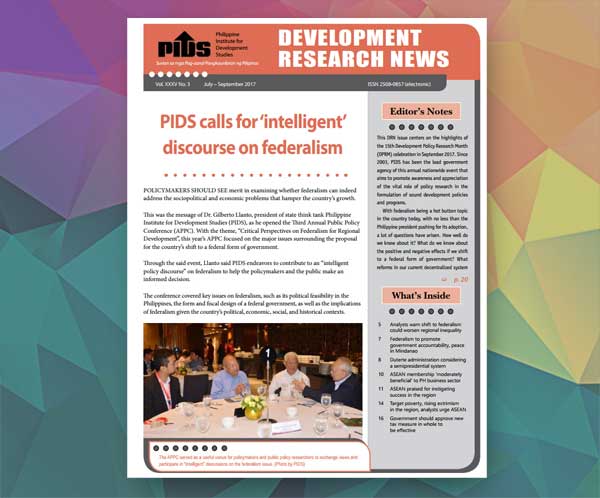
- DRN 2017 Vol. XXXV No. 3: PIDS Calls for 'Intelligent' Discourse on Federalism
by Research Information Staff
This issue of the Development Research News deepens the discussion on federalism, a hot topic in the Philippines today. During the 15th Development Policy Research Month, the country's leading public policy experts shared their views on the pros and cons of federalism and its implications for the Philippines. The banner article features the highlights of the said discussion and presents key questions on the adoption of federalism in the Philippine setting. This issue also covers the 50th year of the formation of the Association of Southeast Asian Nations (ASEAN) and the Philippines' chairmanship of the ASEAN Summit. In line with these events, it features a study on the appreciation of the Philippine business sector of the country's ASEAN membership and the economic benefits that the regional bloc has brought to its member-states. It also includes an article urging the ASEAN to target the perennial problems of poverty and inequality, poor disaster management, inadequate protection of the environment, and the rising extremism, as part of its community-building efforts. Completing this issue is an article discussing the advantages and disadvantages of adopting the Tax Reform for Acceleration and Inclusion bill, particularly its implications for the poor. Click here to download the newsletter.
|
December 13, 2017, 10–12NN
Inauguration of PIDS Corner in Sorsogon
Venue: Sorsogon State College, Sorsogon City
.jpg)
The Philippine Journal of Development is a professional journal published by the Philippine Institute for Development Studies. It accepts papers that examine key issues in development and have strong relevance to policy development. As a multidisciplinary social science journal, it accepts papers in the fields of economics, political science, public administration, sociology, and other related disciplines. It considers papers that have strong policy implications on national or international concerns, particularly development issues in the Asia-Pacific region.
CLICK HERE for the guidelines in the preparation of articles. Submissions and inquiries may be sent to PJD@mail.pids.gov.ph |
POLICY NOTES
- PN 2017-23: Access to Medicines in the Philippines: Overcoming the Barriers
by Ramon L. Clarete and Gilberto M. Llanto
Despite the enactment of the Cheaper Medicines Act in 2008, access to quality health care without incurring financial hardship continues to be an aspiration for many Filipinos. This Policy Note explores the barriers in access to medicines of Filipinos. It also presents key recommendations and strategies policymakers should consider in advancing universal health care in the country. Among others, the study finds an uneven access to medicines in the country due to the limited income of the poor and the lack of doctors in certain communities, even in Metro Manila. It recommends the deepening of the local medicine market to make the competition more effective in lowering prices. It also urges the provision of incentives to local government units to invest more in primary health care with medicines an integral part of their program. Click here for the full article.
- PN 2017-22: Filipino Women in Leadership: Government and Industry
by Clarissa C. David, Jose Ramon G. Albert, and Jana Flor V. Vizmanos
Achieving gender equality is part of the 17 Sustainable Development Goals (SDGs) and the 2030 Agenda for Sustainable Development. United Nations member-states, like the Philippines, have committed to ensure through the said SDG that the rights and privileges afforded to all citizens are the same regardless of sex. This Policy Note presents current statistics on female representation in key leadership positions in the Philippine government and industry. It reveals that Filipino women remain sorely underrepresented in highest positions in both the government and industry. Given the low level of female participation in governance, interventions in both the public and private sectors are needed to improve their representation. Know about these recommended interventions toward a more inclusive and gender-balanced political participation and leadership through this Policy Note. Click here for the full article.
- PN 2017-21: Intersecting Weather Variability and Chronic Food Poverty
by Connie B. Dacuycuy and Lora Kryz C. Baje
Despite the government's various poverty reduction and social protection programs, poverty remains a social problem the country needs to hurdle. This Policy Note aims to contribute to poverty studies in the Philippines by analyzing chronic food poverty and how it is affected by weather variability. Among others, it finds that chronic food poverty is higher for households that experience rainfall deviation than for similar households that do not. Find out how the government can contribute in strengthening the resilience of vulnerable populations to shocks in this article. Click here for the full article.
- PN 2017-20: Strengthening Capacity Building for RTA/FTA Negotiations in APEC
by Erlinda M. Medalla and Francis Mark A. Quimba
Capacity building is crucial and necessary in cooperation and integration efforts between two or among several country partners. This Policy Note discusses capacity-building efforts related to regional trade agreements (RTAs) and free trade agreements (FTAs) among Asia-Pacific Economic Cooperation (APEC) economies. Among others, it identifies consensus building, lack of domestic, institutional, and structural reform, and outreach of FTA and RTA benefits as key areas for capacity building when it comes to implementation. As such, the study urges APEC to extend the coverage of its capacity-building efforts to the strengthening of the foundation in negotiating FTAs and RTAs. It also recommends the inclusion of issues-based approach such as liberalizing traditionally closed sectors or formulating appropriate human resource development policies that would lead to enhanced benefits in general. Click here for the full article.
DISCUSSION PAPERS
- DP 2017-31: Characterization of Agricultural Workers in the Philippines
by Roehlano M. Briones
Inclusive growth requires boosting incomes of workers currently in agriculture, either by shifting them to better-paying jobs outside agriculture or raising wages within agriculture. A comprehensive socioeconomic profile of agricultural workers will facilitate identification and prioritization of their problems, opportunities, and constraints. This study undertakes a review of secondary data toward such a profile. The review identified some gaps, such as degree of deficit in work hours and breakdown of activities for which wages are paid. Find out more about the identified gaps in sustaining and accelerating growth of remunerative employment of agricultural workers in the Philippines through this paper. Click here for the full paper.
- DP 2017-30: Outlook for the Philippine Economy and Agro-Industry to 2030: The Role of Productivity Growth
by Roehlano M. Briones
The main driver of long-run economic growth is total factor productivity. Among the basic sectors, namely, agriculture, industry, and services, inclusiveness of economic growth depends most importantly on agriculture. This study provides growth projections for the Philippine agriculture based on growth in productivity differentiated by basic sector, using a computable general equilibrium model.
Scenario analysis finds that the current policy thrust for agriculture of subsidizing capital cost slightly accelerates growth of agriculture, but slows down overall growth by reducing capital formation. Read more about the suggested policies to accelerate long-term productivity growth across all sectors—especially in agriculture—through this paper. Click here for the full paper.
|

|
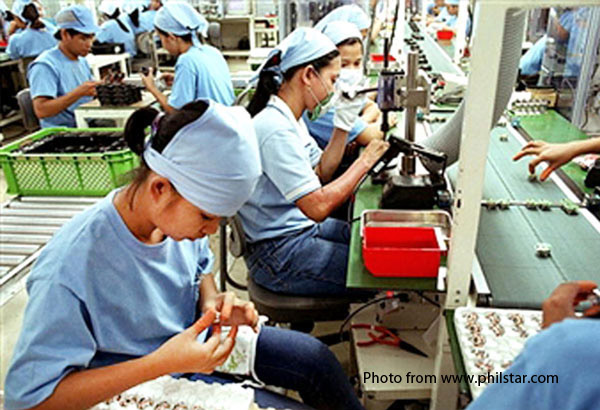
PH ranks low in innovation index — PIDS
The Philippines needs to beef up its innovation capacity. Recent data show it has not scored well in the Global Innovation Index, ranking fifth among seven ASEAN member-states and 73rd among 127 countries.
According to Philippine Institute for Development Studies Senior Research Fellow Jose Ramon Albert, this poor performance can be attributed to the low amount of public expenditures on research and development, inadequate number of research scientists and engineers, inadequate infrastructure, restrictive regulations that hamper the conduct of research, and the weak linkages of firms engaged in innovation activities with government and the academe. READ MORE |
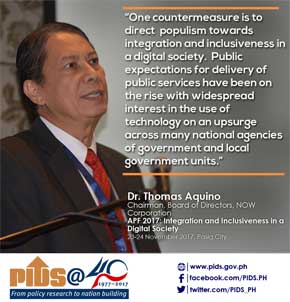
Free trade ‘took back seat’ under Duterte admin – trade expert
The free trade movement in the Philippines “took back seat” as the Duterte administration shifted the government focus to addressing the ills of society, according to a Philippine trade expert.
During the Asia-Pacific Forum 2017 on Integration and Inclusiveness in a Digital Society, Dr. Thomas Aquino, former undersecretary of the Department of Trade and Industry, claimed the current administration is prioritizing issues that confront the Philippine leadership, such as the integration of the Philippine society via new legislation and the challenges facing Mindanao, while pushing the free trade movement to the back seat. READ MORE |
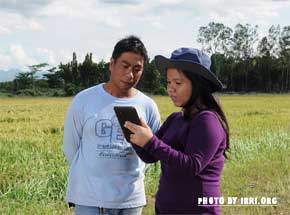
Digital economy should be inclusive — advocates
In the age of digital economy, no one should be left behind.
This was according to advocates who spoke at the seminar on “The Digital Economy: Potential Benefits, Challenges, and Implications for Regulations” jointly organized by the Philippine Institute for Development Studies and India-based Consumer Unity and Trust Society International.
On the finance aspect, for example, Lito Villanueva, managing director of PLDT’s financial-technology arm FINTQ, said that while the 2017 Brookings Financial and Digital Inclusion Project ranked the Philippines high in three dimensions of financial inclusion—country commitment, mobile capacity, and regulatory environment—it has to improve in the areas of adoption of digital and financial services. READ MORE |
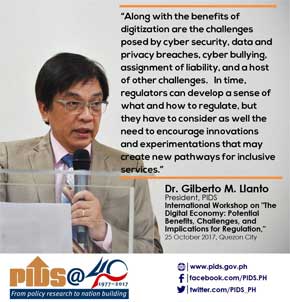
Regulations are key to unlock optimal benefits of digital economy — PIDS
Digital economy is beneficial but it has to be regulated.
According to Philippine Institute for Development Studies (PIDS) President Gilberto Llanto, the digital economy is “arguably changing the landscapes of job, product, and service markets”.
“Digitization, big data, advanced analytics, and disruptive technologies interact in a variety of ways creating new waves of innovation, productivity, and growth in a manner that has not been seen before,” he said during the launch of the Regional Inclusive Growth Project Consumer Unity and Trust Society (CUTS), a joint project of PIDS and CUTS International. READ MORE |

Need help? Have feedback? Feel free to contact us.
If you do not want to receive PIDS Updates, click here.
© 2017 Philippine Institute for Development Studies.

 
|
|


.jpg)





